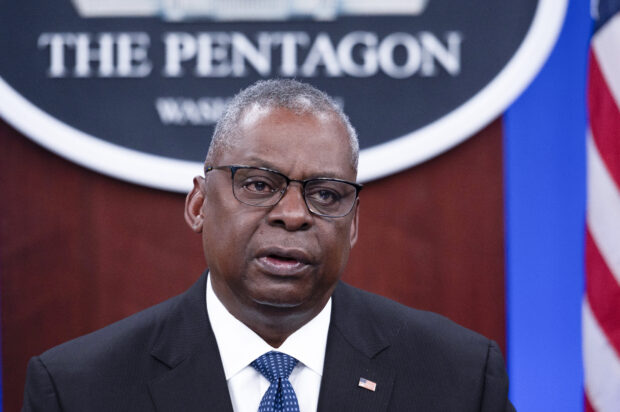Austin ordered strikes on Houthis from hospital, says Pentagon

FILE PHOTO: Secretary of Defense Lloyd Austin speaks at a virtual Ukraine Defense Contact Group (UDCG) meeting, Nov. 22, 2023, at the Pentagon in Washington. The secrecy surrounding Austin’s hospitalizations due to prostate cancer surgery set off a political firestorm, launched multiple reviews and triggered calls for his ouster. (AP Photo/Cliff Owen, File)
WASHINGTON — From his hospital room, Defense Secretary Lloyd Austin first orchestrated and then watched in real-time as the US retaliatory attack on Yemen-based Houthi militants unfolded Thursday night.
Austin’s hospital-room leadership was the latest in a series of actions the defense chief has carried out from Walter Reed National Military Medical Center, where he has been recovering from complications due to treatments for prostate cancer.
Austin only revealed he had prostate cancer on Tuesday – the same day that the Houthis launched their most aggressive onslaught to date of 18 drones and missiles at commercial and military vessels in the Red Sea. That attack set the stage for Thursday’s military operation.
Austin is now on his 12th day of hospitalization at Walter Reed and the Pentagon does not know what day he will be released.
On Friday, President Joe Biden said it was a lapse in judgment for Austin to keep his hospitalization and prostate cancer diagnosis a secret, but said he still has confidence in the Pentagon chief.
Article continues after this advertisementIn the days since, Austin has turned his room into a secure communications suite. He’s called top military leaders, talked to the president, considered options and later ordered the strikes, Pentagon press secretary Maj. Gen. Pat Ryder said Friday.
Article continues after this advertisementAustin’s hospital room setup is not unlike when he is on the road, where full security and communications teams accompany him with all of the secure, classified equipment needed to keep him connected. Austin’s aides and support staff have been with him all week at Walter Reed as well.
So on Tuesday, as the Houthis launched 18 one-way attack drones and anti-ship missiles, Austin was watching the attacks and the US and British response intercepting those drones by secure video in real time, as were Joint Chiefs Chairman Gen. CQ Brown and US Central Command chief Gen. Erik Kurilla. The three have remained in contact and been in regular calls with the National Security Council over the past few days.
The Houthis’ Tuesday attack occurred after the US and a host of international partners had already issued an ultimatum to cease the attacks or face severe consequences.
Shortly after that attack, Austin recommended to the White House that military action was necessary. On Thursday, President Joe Biden approved the response and Austin gave the order to strike.
READ: Austin’s lack of disclosure on hospital stay to be reviewed
That evening, Austin again monitored real-time operations from his hospital room, this time the strikes he’d ordered. Brown was also watching via secure communications from inside his official residence, where he’d been hosting a reception, a US official said. The official spoke on condition of anonymity to discuss details that have not been publicly released.
Shortly after, Austin issued a statement on the operation, which involved F/A-18 fighter jets and E-2C Hawkeye radar planes launching from aircraft carrier Dwight D. Eisenhower, U.S. Air Force warplanes, a US submarine and several other U.S. and British ships firing more than 150 missiles at 28 locations involving more than 60 targets in Houthi-controlled areas of Yemen.
Following the strikes, Austin spoke with the National Security Council, the Joint Chiefs chairman and the head of US Central Command for an initial post-strike assessment. While the Pentagon has not released a damage assessment, multiple officials have said they believe that the Houthis’ ability to conduct another round of ship attacks has been degraded.
Austin has been hospitalized since Jan. 1, when an ambulance took him to Walter Reed. The defense secretary was conscious at the time but in severe pain, and was admitted to the intensive care unit. A surgery he’d undergone Dec. 22 to address his prostate cancer had resulted in an infection including an abdominal fluid collection, and it had to be drained by placing a tube through his nose to drain his stomach. For days, few knew he was in hospital or in intensive care – the White House only learned on Jan. 4 that he was at Walter Reed.
Austin’s delays in disclosing his prostate cancer and his hospitalization have roiled the administration, Pentagon and Congress. Pentagon officials have repeatedly said that Austin has been performing his duties for the last week, even as he remains hospitalized.
Speaking to reporters Friday as he toured local businesses outside Allentown, Pennsylvania, Biden said “yes” when asked if it was a lapse in judgment for Austin not to tell him about his condition. He replied, “I do,” when asked if he still had confidence in Austin’s leadership.